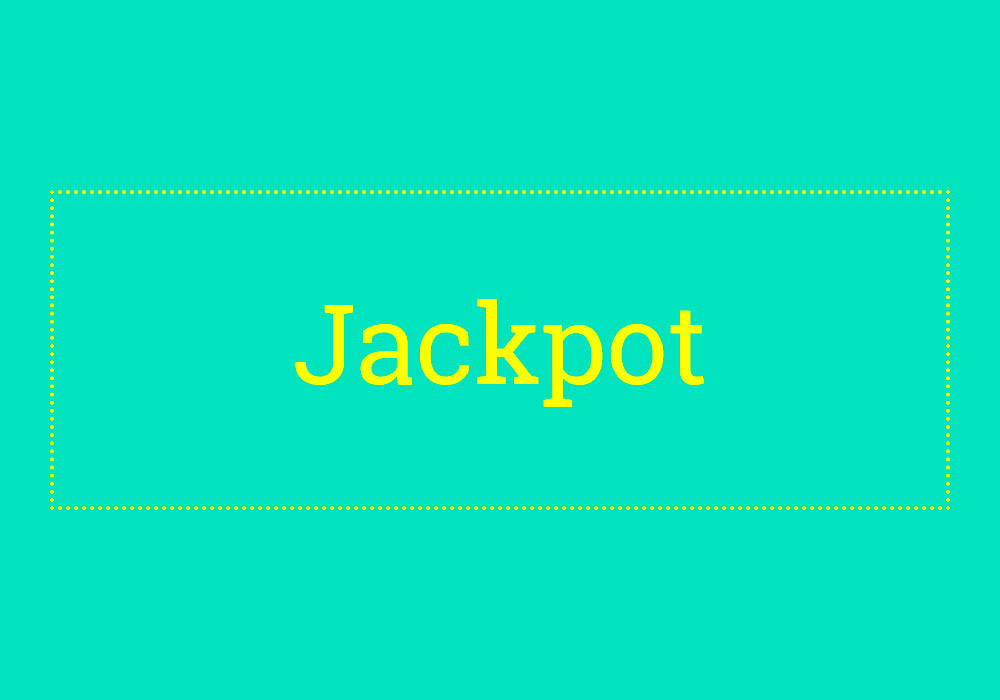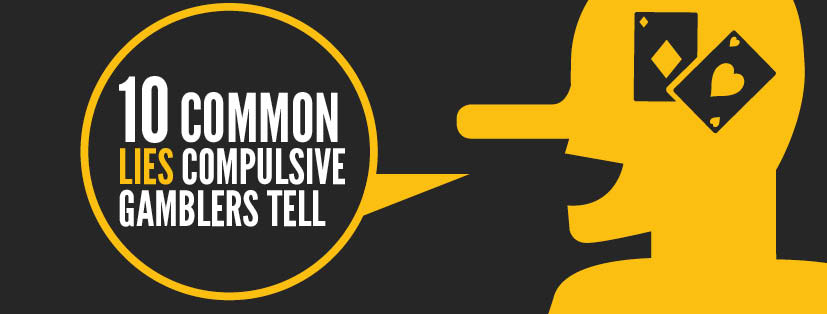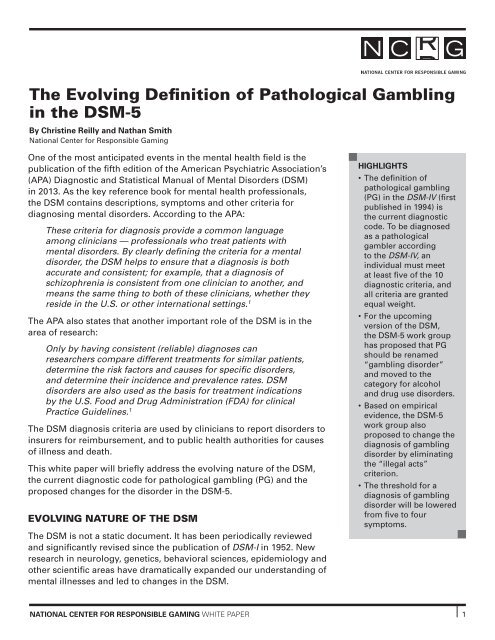Pathological Gambling Def 3,6/5 1406 votes
Gambling Disorder (Compulsive Gambling, Pathological Gambling) Betting the farm can actually be a serious problem for some people. Compulsive and habitual gambling can destroy a person's life.
Also found in: Thesaurus, Medical, Legal, Encyclopedia, Wikipedia.- For gambling disorder have been met for at least 3 months but for less than 12 months. In sustained remission: After full criteria for gambling disorder were previously met, none of the criteria for gambling disorder have been met during a period of 12 months or longer. Specify current severity.
- Pathological Gambling Disorder Pathological gambling disorder is seen as gambling which is uncontrollable and can alter and adversely affect the individual’s recreational and social activities. This disorder has an extremely disruptive and adverse affect on the life of the individual that suffers from it.
- Psychology Definition of PATHOLOGICAL GAMBLING: an impulse-control disorder marked by continual, maladaptive wagering, generating substantial interpersonal, occupational, or money-related troubles.
Related to pathological: Pathological liar, sociopath, Pathological narcissism
path·o·log·i·cal
 (păth′ə-lŏj′ĭ-kəl) also path·o·log·ic(-ĭk)adj.
(păth′ə-lŏj′ĭ-kəl) also path·o·log·ic(-ĭk)adj.2. Relating to or caused by disease.
3. Of, relating to, or manifesting behavior that is habitual, maladaptive, and compulsive: a pathological liar.
American Heritage® Dictionary of the English Language, Fifth Edition. Copyright © 2016 by Houghton Mifflin Harcourt Publishing Company. Published by Houghton Mifflin Harcourt Publishing Company. All rights reserved.
pathological
( ˌpæθəˈlɒdʒɪkəl) orless commonly
ˌpæθəˈlɒdʒɪkəl) orless commonlypathologic
adj2. (Pathology) relating to, involving, or caused by disease
3. (Psychiatry) informal compulsively motivated: a pathological liar.
Collins English Dictionary – Complete and Unabridged, 12th Edition 2014 © HarperCollins Publishers 1991, 1994, 1998, 2000, 2003, 2006, 2007, 2009, 2011, 2014
path•o•log•i•cal
(ˌpæθ əˈlɒdʒ ɪ kəl)also path`o•log′ic,
adj.
2. caused or affected by disease.
3. characterized by an unhealthy compulsion: a pathological liar.
path`o•log′i•cal•ly,adv.
Random House Kernerman Webster's College Dictionary, © 2010 K Dictionaries Ltd. Copyright 2005, 1997, 1991 by Random House, Inc. All rights reserved.
| Adj. | 1. | pathological - of or relating to the practice of pathology; 'pathological laboratory' |
| 2. | pathological - caused by or evidencing a mentally disturbed condition; 'a pathological liar'; 'a pathological urge to succeed' psychoneurotic, neurotic - affected with emotional disorder | |
| 3. | pathological - caused by or altered by or manifesting disease or pathology; 'diseased tonsils'; 'a morbid growth'; 'pathologic tissue'; 'pathological bodily processes' unhealthy - not in or exhibiting good health in body or mind; 'unhealthy ulcers' |
Based on WordNet 3.0, Farlex clipart collection. © 2003-2012 Princeton University, Farlex Inc.
pathological

adjectiveobsessive, chronic, persistent, compulsive, unreasonable, irrational, habitual, confirmed, illogical, inveteratehis pathological jealousy
Collins Thesaurus of the English Language – Complete and Unabridged 2nd Edition. 2002 © HarperCollins Publishers 1995, 2002
patologický
kóros
patologický
pathological
[ˌpæθəˈlɒdʒɪkəl]ADJ (lit, fig) → patológicoCollins Spanish Dictionary - Complete and Unabridged 8th Edition 2005 © William Collins Sons & Co. Ltd. 1971, 1988 © HarperCollins Publishers 1992, 1993, 1996, 1997, 2000, 2003, 2005
pathological
[ˌpæθəˈlɒdʒɪkəl]adj [fear, jealousy] → maladif/ive
a pathological liar → un(e) menteur/euse m/finvétéré(e)
a pathological liar → un(e) menteur/euse m/finvétéré(e)
Collins English/French Electronic Resource. © HarperCollins Publishers 2005
Pathological Gambling Definition
pathological
adj (lit, fig) → pathologisch, krankhaft; studies etc → pathologisch
Collins German Dictionary – Complete and Unabridged 7th Edition 2005. © William Collins Sons & Co. Ltd. 1980 © HarperCollins Publishers 1991, 1997, 1999, 2004, 2005, 2007
pathological
[ˌpæθəˈlɒdʒɪk/əl]adj (also) (fig) → patologico/aCollins Italian Dictionary 1st Edition © HarperCollins Publishers 1995
pathology
 (pəˈθolədʒi) noun
(pəˈθolədʒi) noun the science of diseases. patologie الباثولوجيا: عِلْم الأمْراض патология patologia patologie die Pathologie patologi; sygdomslære παθολογίαpatología patoloogia آسیب شناسی patologia pathologieפתולוגיה रोग-विज्ञान patologija patológia ilmu penyakit meina-/sjúkdómafræði patologia 病理学 병리학 patologija patoloģija patologi pathologiepatologi patologia پاتالوجي دناروغۍ پيژندنه patologia patologie патология patológia patologija patologija patologi พยาธิวิทยา hastalıklar bilimi, patoloji 病理學 патологія علم الامراض bệnh lý học 病理学
paˈthologist noun patoloog إخْتِصاصي في علِم الأمْراض патолог patologista patolog der Pathologe patolog παθολόγοςpatólogo patoloog آسیب شناس patologi pathologisteפתולוג रोगविज्ञानी patolog kórboncnok ahli patologi meina-/sjúkdómafræðingur patologo 病理学者 병리학자 patologas patologs pakar patologi patholoogpatolog patolog دناروغۍ پيژندونكى patologista patolog патолог patológ patolog patolog patolog นักพยาธิวิทยา patalog 病理學家 патолог ماہر علوم امراض nhà nghiên cứu bệnh học 病理学家
ˌpathoˈlogical adjective patologies مُتَعَلِّق في عِلْم الأمْراض патологичен patológico patologický pathologisch patologisk παθολογικόςpatológico haiguslik وابسته به بیماری یا علت بیماری patologinen pathologiqueפתולוגי रोग विज्ञानीय patološki kóros patologis sjúklegur patologico 病理学の 병리학의 patologinis, patologiškas patoloģisks patologi pathologischpatologisk patologiczny دناروغۍ په پيژند ګلوى پورې مربوط patológico patologic патологический patologický bolezenski patološki patologisk เกี่ยวกับพยาธิวิทยา patalojik 病理學的 патологічний علوم امراض سے متعلق bệnh lý 病理学的
ˌpathoˈlogically adverb patologies بِصورَة مُتَعَلِّقَة بِعِلْم الأمْراض патетично patologicamente patologicky pathologisch patologiskt παθολογικά patológicamente haiguslikult از نظر آسیب شناسی patologisesti pathologiquement בְּצוּרָה פָּתוֹלוֹגִית रोगात्मक रूप से patološki kórosan secara patologis sjúklega patologicamente 病理学上 병적으로 patologiškai patoloģiski penyakit pathologischpatologisk chorobliwie د پتالوژى له نظره patologicamente patologic патологически patologicky bolezensko patološki patologiskt อย่างที่เกี่ยวกับพยาธิวิทยา patalojik olarak 病理學地 патологічно علم الامراض کے مطابق một cách bệnh hoạn 病理学地
Kernerman English Multilingual Dictionary © 2006-2013 K Dictionaries Ltd.
path·o·log·ic
, pathologicala. patológico-a, rel. a o producido por enfermedades.
pathological, pathologic
adj patológicoEnglish-Spanish/Spanish-English Medical Dictionary Copyright © 2006 by The McGraw-Hill Companies, Inc. All rights reserved.
Want to thank TFD for its existence? Tell a friend about us, add a link to this page, or visit the webmaster's page for free fun content.
Link to this page:
Pathological gambling disorder is seen as gambling which is uncontrollable and can alter and adversely affect the individual’s recreational and social activities. This disorder has an extremely disruptive and adverse affect on the life of the individual that suffers from it. As a result of this pathological gambling, individuals may end up losing all of their life savings, and may also be forced to commit various crimes including forging checks, stealing or embezzling in order to acquire more money to fulfill their compulsive habit. This disorder can also lead to the development of major problems in relationships as well as jobs.
Pathological gambling can also be described as an Impulse Control Disorder1 or process addiction which is different from addictions to elements such as alcohol, food, tobacco and drugs. These types of addictions include a ‘high’ or a ‘rush’ which is gained when certain actions are performed as part of the addictive behavior. In case of gambling, the individuals may gain the ‘high’ from the overall setting and atmosphere of the place, for example a bingo hall, casino, race track and other places. The feeling that the individual gets from taking risks in this environment can evoke the addiction further. In many cases it is seen that compulsive gamblers own a piece of clothing or accessory which they claim is lucky for their gambling, and hence wear it every time they participate in a gambling activity. Some of these individuals use the piece of clothing or accessory to acquire the ‘high’ or ‘rush’ before gambling.
Causes:
The definite causes of pathological gambling disorder are unknown, although there are a number of studies and surveys that indicate that there is a significant difference on biological levels, between the general population and the compulsive gamblers. These surveys however cannot form the basis of the causes of pathological gambling. Many people tend to use their habit of gambling in order to gain an escape from signs of depressions which is more commonly seen in women than in men. Some of the gamblers seek to gamble in order to alter their moods because of the intense amount of energy and excitement that is commonly seen in gambling rooms. Thus, it is common to find that some people may be interested in other aspects of gambling than simply the money that is involved. It can be said that they ‘rush’ or ‘high’ that is seen in individuals suffering from pathological gambling disorders may not be associated with the money.
Symptoms:
Some of the most common symptoms that are seen in individuals suffering from pathological gambling disorder include immense amount of preoccupation with activities associated with gambling which tend to interfere with the individual’s social, occupational and personal life. The individual fells that he/she cannot control these gambling instincts and thus continues to visit casinos to place bets, failing to stop or cut down on the habit. One of the most commonly seen behaviors among compulsive gamblers is known as chasing. Chasing refers to placing bets of large amounts of money and thus taking more risks. This is done in order to make up for money that has been lost in gambling previously by the individual. The individual is also prone to immoral activities such as lying, forgery, stealing, fraud involved with credit cards, embezzling, and various other behaviors that are associated with acquiring money for gambling.
Demographics:
Gambling disorder affects more males than females in the United States with a sex ratio of 2:1. Over all as many as 4% of the population of the United States might meet the criteria for the disorder. In some countries this percentage is as high as 7%.
Diagnosis:
The disorder is usually diagnosed when an affected persons family or spouse become concerned and is seldom self reported. The most common symptom that most patients suffer from is Denial.
The Diagnostic and Statistical Manual of Mental Disorders(4th edition), specifies that a person affected with pathological gambling disorder must have at least 5 of the following symptoms to meet the diagnostic criteria for the disorder:
Pathological Gambling Definition
- The person thinks about gambling almost all the time
- The person keeps using larger and larger amounts of money every time when gambling
- The person has tried to stop gambling but has been unable to do so
- Whenever the gambling is stopped, the person becomes moody or cranky
- The person uses gambling as a method to escape problems
- The person continues to gamble in order to win back the money that has been lost (“chasing”)
- The person lies about the severity and extent of gambling
- The person has engaged in illegal or immoral behavior in order to make money for gambling
- The person has problems at home or work because of the gambling
- The person tends to rely on other people to get out of financial problems that have been caused by gambling
Pathological Gambling Definition
Treatments:
There are many treatments available for pathological gambling disorder:
- Psychodynamic Psychotherapy
- Cognitive Behavioral Therapy
- Substance Abuse Treatment
- Relaxation Techniques
- Aversion Therapy
- Gamblers Anonymous
References:
Impulse Control Disorders: A Clinician’s Guide to Understanding and Treating Behavioral Addictions Jon E. Grant
APA: Diagnostic and Statistical Manual of Mental Disorders. 4th ed. text revision